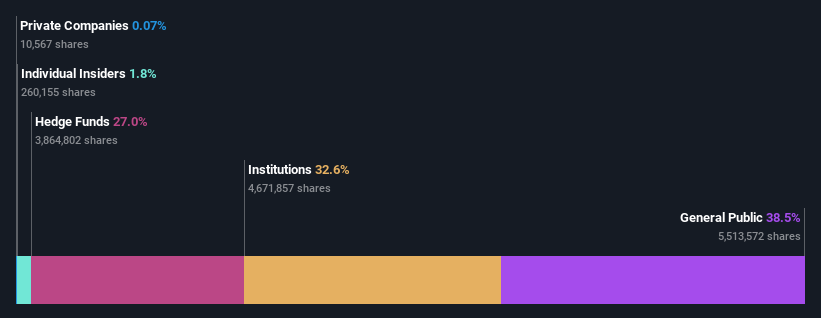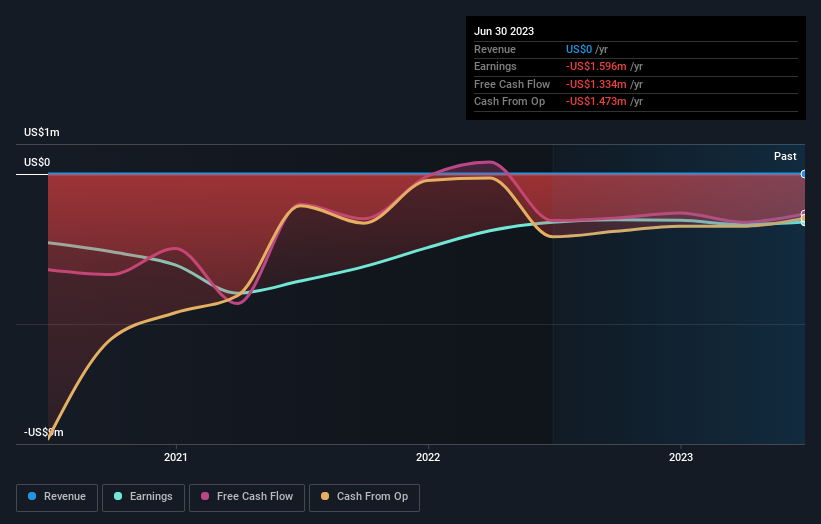Merrimack Pharmaceuticals, Inc. (NASDAQ:MACK) most popular amongst retail investors who own 39% of the shares, institutions hold 33%
Key Insights
Significant control over Merrimack Pharmaceuticals by retail investors implies that the general public has more power to influence management and governance-related decisions
51% of the business is held by the top 11 shareholders
To get a sense of who is truly in control of Merrimack Pharmaceuticals, Inc. (NASDAQ:MACK), it is important to understand the ownership structure of the business. And the group that holds the biggest piece of the pie are retail investors with 39% ownership. Put another way, the group faces the maximum upside potential (or downside risk).
Institutions, on the other hand, account for 33% of the company's stockholders. Institutions often own shares in more established companies, while it's not unusual to see insiders own a fair bit of smaller companies.
Let's delve deeper into each type of owner of Merrimack Pharmaceuticals, beginning with the chart below.
Check out our latest analysis for Merrimack Pharmaceuticals
What Does The Institutional Ownership Tell Us About Merrimack Pharmaceuticals?
Many institutions measure their performance against an index that approximates the local market. So they usually pay more attention to companies that are included in major indices.
We can see that Merrimack Pharmaceuticals does have institutional investors; and they hold a good portion of the company's stock. This suggests some credibility amongst professional investors. But we can't rely on that fact alone since institutions make bad investments sometimes, just like everyone does. When multiple institutions own a stock, there's always a risk that they are in a 'crowded trade'. When such a trade goes wrong, multiple parties may compete to sell stock fast. This risk is higher in a company without a history of growth. You can see Merrimack Pharmaceuticals' historic earnings and revenue below, but keep in mind there's always more to the story.
It would appear that 27% of Merrimack Pharmaceuticals shares are controlled by hedge funds. That worth noting, since hedge funds are often quite active investors, who may try to influence management. Many want to see value creation (and a higher share price) in the short term or medium term. Looking at our data, we can see that the largest shareholder is Western Standard, LLC with 14% of shares outstanding. For context, the second largest shareholder holds about 13% of the shares outstanding, followed by an ownership of 4.7% by the third-largest shareholder. In addition, we found that Gary Crocker, the CEO has 0.9% of the shares allocated to their name.
After doing some more digging, we found that the top 11 have the combined ownership of 51% in the company, suggesting that no single shareholder has significant control over the company.
While it makes sense to study institutional ownership data for a company, it also makes sense to study analyst sentiments to know which way the wind is blowing. As far as we can tell there isn't analyst coverage of the company, so it is probably flying under the radar.
Insider Ownership Of Merrimack Pharmaceuticals
While the precise definition of an insider can be subjective, almost everyone considers board members to be insiders. The company management answer to the board and the latter should represent the interests of shareholders. Notably, sometimes top-level managers are on the board themselves.
Most consider insider ownership a positive because it can indicate the board is well aligned with other shareholders. However, on some occasions too much power is concentrated within this group.
Shareholders would probably be interested to learn that insiders own shares in Merrimack Pharmaceuticals, Inc.. In their own names, insiders own US$3.2m worth of stock in the US$177m company. This shows at least some alignment, but we usually like to see larger insider holdings. You can click here to see if those insiders have been buying or selling.
General Public Ownership
The general public-- including retail investors -- own 39% stake in the company, and hence can't easily be ignored. While this size of ownership may not be enough to sway a policy decision in their favour, they can still make a collective impact on company policies.
Next Steps:
I find it very interesting to look at who exactly owns a company. But to truly gain insight, we need to consider other information, too. Case in point: We've spotted 2 warning signs for Merrimack Pharmaceuticals you should be aware of, and 1 of them shouldn't be ignored.
Of course this may not be the best stock to buy. Therefore, you may wish to see our free collection of interesting prospects boasting favorable financials.
NB: Figures in this article are calculated using data from the last twelve months, which refer to the 12-month period ending on the last date of the month the financial statement is dated. This may not be consistent with full year annual report figures.
Have feedback on this article? Concerned about the content? Get in touch with us directly. Alternatively, email editorial-team (at) simplywallst.com.
This article by Simply Wall St is general in nature. We provide commentary based on historical data and analyst forecasts only using an unbiased methodology and our articles are not intended to be financial advice. It does not constitute a recommendation to buy or sell any stock, and does not take account of your objectives, or your financial situation. We aim to bring you long-term focused analysis driven by fundamental data. Note that our analysis may not factor in the latest price-sensitive company announcements or qualitative material. Simply Wall St has no position in any stocks mentioned.


